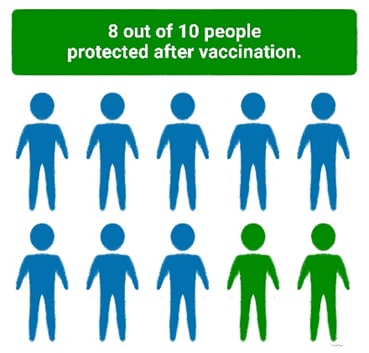Vaccine Safety & Effectiveness
The dengue vaccine protects against all four types of dengue
- Dengue is a disease caused by any of the four dengue virus types: dengue 1, 2, 3, and 4. Therefore, people can be infected with dengue multiple times in their life.
- If they have previously had dengue, the dengue vaccine can protect your child against illness or hospitalization caused by dengue.

The dengue vaccine is safe and effective
- The vaccine is safe and effective among children who have previously had dengue.
- Dengvaxia protects against illness from dengue 8 out of 10 times in children who had dengue before vaccination.
- While the vaccine is highly effective, there is a low risk that some vaccinated people can still get infected with dengue. This is called vaccine breakthrough.
The vaccine has few side effects
For children who HAVE already had dengue
- The most common side effects include soreness, itchiness, or pain in the injection site, headaches, lack of energy, and general discomfort. These side effects are normal signs that the body is building protection, and the side effects should go away within a few days.
- People sometimes faint after medical procedures, including vaccination. Tell your provider if you feel dizzy or have vision changes or ringing in the ears.
- As with any medicine, there is a very remote chance of a vaccine causing a severe allergic reaction, other serious injury, or death.
Why people without a previous dengue infection should not be vaccinated
- The dengue vaccine is the only vaccine available in the United States that requires testing prior to vaccination to confirm that your child has had dengue before.
- In children who have NOT already had dengue, the dengue vaccine increases the risk of severe illness and hospitalization if the child is later infected with dengue.
- Therefore, to reduce the risk of vaccinating children who have never had dengue, a blood test can check for a previous dengue infection.
- If the test results are positive, your child can be vaccinated.
- If the test results are negative, your child won’t be able to get vaccinated.
- Therefore, to reduce the risk of vaccinating children who have never had dengue, a blood test can check for a previous dengue infection.